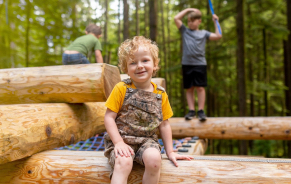Benefits of Outdoor Education
Spending time outdoors boasts many benefits to a person’s overall well-being. It has been proven to reduce stress and even increase focus and effective learning for some children. However, traditional curriculum shifted and intensified focus towards test-based accountability learning, leaving less emphasis on experiential outdoor learning [1]. Immersive outdoor education and adventure based learning has been shown to provide endless benefits to a student’s overall well-being as well as test scores in many studies.
Below are a compilation of the Top Ten Benefits of Outdoor Education and Experiential Learning:
1. Suitability for Learning Styles
Beneficial to all students learning, especially to those that do not excel in traditional classroom settings as it allows for more self directed learning and autonomy
2. Higher Grades
Gains in cognitive learning, meaning increased performance in an academic setting [2]
3. Increased Motivation
Higher rates of emotional engagement for students and therefore increases motivation for learning overall [1]
4. Sparking Passions for Science
The real application of environmental science concepts in immersive settings benefits students with a more apathetic stance towards science and learning [1]
5. Self-efficacy
Increased self-efficacy and confidence in students’ participating in outdoor learning and adventure programs [3]
6. Mindfulness
Increased mindfulness through immersive environmental experiences by creating both physical and psychological distance from daily routine stress of deadlines, social demands, etc. [3]
7. Personal Growth
Triggers an ongoing cycle of personal growth in participants [4]
8. Positive Behaviour
Helps to reduce and avoid behavioural problems for children at risk by allowing for more physical activity and reduced motor and verbal agitation [5]

9. Environmental Attitudes
Promotes healthier and deeper connections between students and the environment, creating better attitudes about the environment [6]
10. Overall Health
Time outdoors have proven to decrease cortisol levels and increase participants overall mental health and interpersonal communication and relationships [3]
These are just 10 of many benefits for getting kids outdoors! For benefits related to hyperactivity, be sure to check out our blog post on Benefits of Outdoor Learning for Neurodiverse children.
References:
[2] Eaton, D. (2000). Cognitive and affective learning in outdoor education (Doctoral dissertation, National Library of Canada= Bibliothèque nationale du Canada).
[3] Mutz, M., & Müller, J. (2016). Mental health benefits of outdoor adventures: Results from two pilot studies. Journal of Adolescence, 49(June), 105-114. doi:10.1016/j.adolescence.2016.03.009
[4] Neill, J. T., & Richards, G. E. (1998). Does outdoor education really work? A summary of recent meta-analyses. Australian Journal of Outdoor Education, 3(1).
[5] Fiskum, T. A., & Jacobsen, K. (2012). Individual differences and possible effects from outdoor education: Long time and short time benefits. World Journal of Education, 2(4), 20.
[6] Palmberg, I. E., & Kuru, J. (2000). Outdoor activities as a basis for environmental responsibility. The Journal of Environmental Education, 31(4), 32-36





